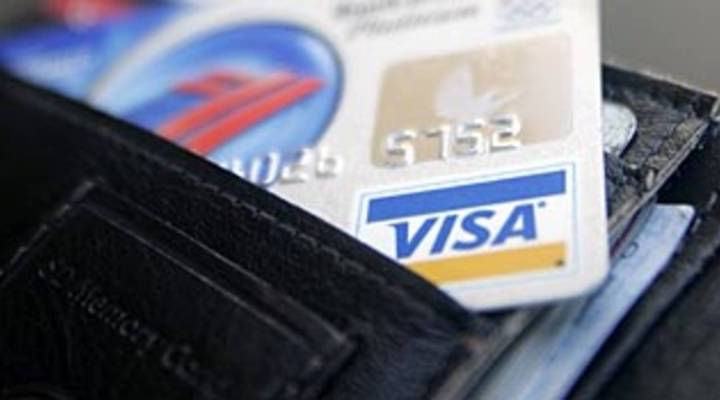
The changing attitude about prepaid debit cards

TEXT OF STORY
Tess Vigeland: Congratulations! You’re becoming more responsible with your credit cards. The Federal Reserve reported this week that Americans continued to pay down their cards in August, marking two straight years of monthly declines.
So does that mean we’ve all turned to cash? Well, no. A new kind of card is gaining in popularity: prepaid debit cards.
Marketplace’s Stacey Vanek Smith has more.
Stacey Vanek Smith: Wendi Rogers finally got her Ph.D in May, and, after six years of graduate school, she was strapped. So to help her out, Rogers’ parents got her a prepaid card at the local grocery store and loaded it up with $30 every week.
Wendi Rogers: That way I knew I had money for food. From everything from milk to toilet paper, you’ve got $30 to spend, that’s what you got.
Rogers loved the card, but says using it isn’t always so comfortable.
Rogers: I’ve noticed that the clerks, once they see you’re using a prepaid card, I don’t want to say they wrinkle their nose, but there is that definite shift in perception.
Traditionally prepaid cards have been a kind of last resort for people whose credit wasn’t good enough to get a checking account or a credit card.
Ron Shevlin analyses banking products for the Aite Group. He says the recession has changed our attitude toward credit and our attitude toward prepaid cards.
Ron Shevlin: With the result of the downturn of the economy, a lot more consumers have become a lot more disciplined about managing their finances and are looking for ways to help them plan their budgets and very importantly keep to their budgets.
Dr. Wendi Rogers recently landed a job and can buy her own groceries now, but she’s held onto her prepaid card, loading it up herself every week. She says it’s a good budgeting tool.
Rogers: It just removes the temptation to go to a coffee shop and get a cup of tea instead of groceries. It really does provide a structure that wasn’t there.
The prepaid card industry is expected to top $360 billion next year. Some prepaid cards, like Wendi Rogers’ grocery card, are linked to individual businesses like Office Depot or Target. They don’t tend to charge any fees and they usually come with rewards. Those prepaid cards have some perks, but you can only use them in one place. People who want their prepaid debit cards to have more flexibility have to pay for it.
Commercial: It’s the prepaid Visa RushCard. When you put money onto your Rush card, you have 24 hour access to your funds. Available in sleek black or stylish pink!
The RushCard was started by music mogul Russell Simmons in 2003. More than 2.5 million people now use it. Most directly deposit their paychecks onto the card. Simmons says originally, most of his customers were people who couldn’t get credit.
Russell Simmons: America operates on plastic. If you don’t have any kind of card, you’re locked out of the American dream. You can’t go to the Internet and buy nothing, you can’t order nothing over the phone, you can’t rent a hotel room.
Simmons says these days, a lot of his business is coming from people who are defecting from banks, angry about bailouts and discouraged by new restrictions and fees.
Simmons: Thirty percent of our new customers have a bank account and decided they like RushCard better.
The market for RushCard and others like it is growing roughly 20 percent a year. Not that those cards are free. The RushCard costs about $10 a month, plus extra if you want to check your balance, use an ATM more than twice a month or get a paper statement.
Robert Manning: You’re going to have to read the fine print really, really carefully.
Robert Manning is the author of “Credit Card Nation.” He points out that prepaid cards are sometimes called “fee harvesters” and can end up costing a lot. As prepaid debit cards get more popular, Manning predicts issuers will get more creative about getting people to use them.
Manning: We’re going to see all kinds of approaches where cards now are going to help you become better stewards of your financial resources.
The RushCard offers to help people rebuild their credit score. If customers sign up to pay their bills with their RushCard, the card will report those on-time payments to credit reporting agencies. Of course if you want to pay your bills with the RushCard, you’ll have to pay a fee.
I’m Stacey Vanek Smith for Marketplace Money.
There’s a lot happening in the world. Through it all, Marketplace is here for you.
You rely on Marketplace to break down the world’s events and tell you how it affects you in a fact-based, approachable way. We rely on your financial support to keep making that possible.
Your donation today powers the independent journalism that you rely on. For just $5/month, you can help sustain Marketplace so we can keep reporting on the things that matter to you.












